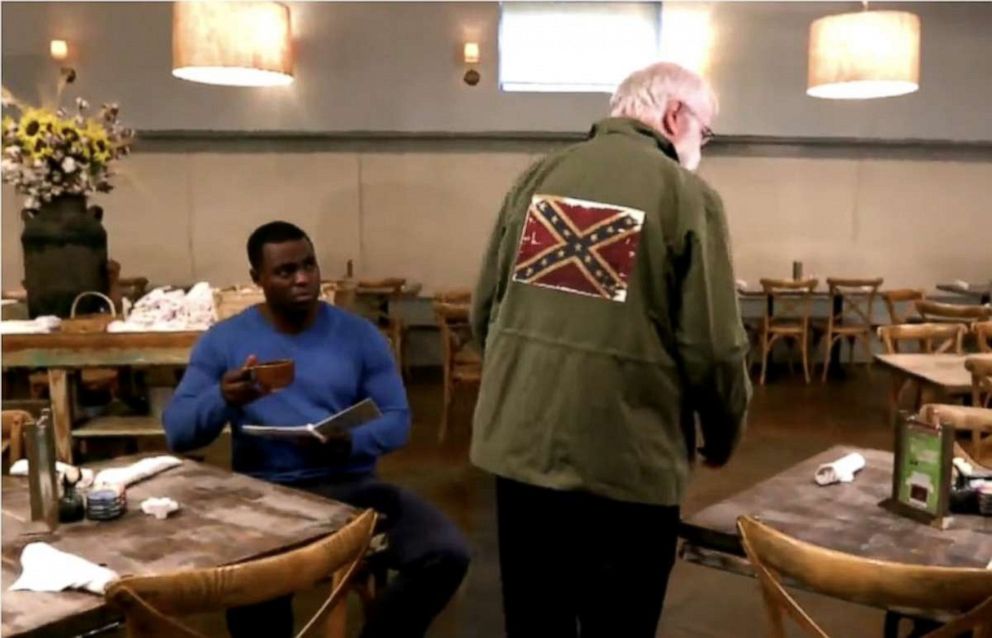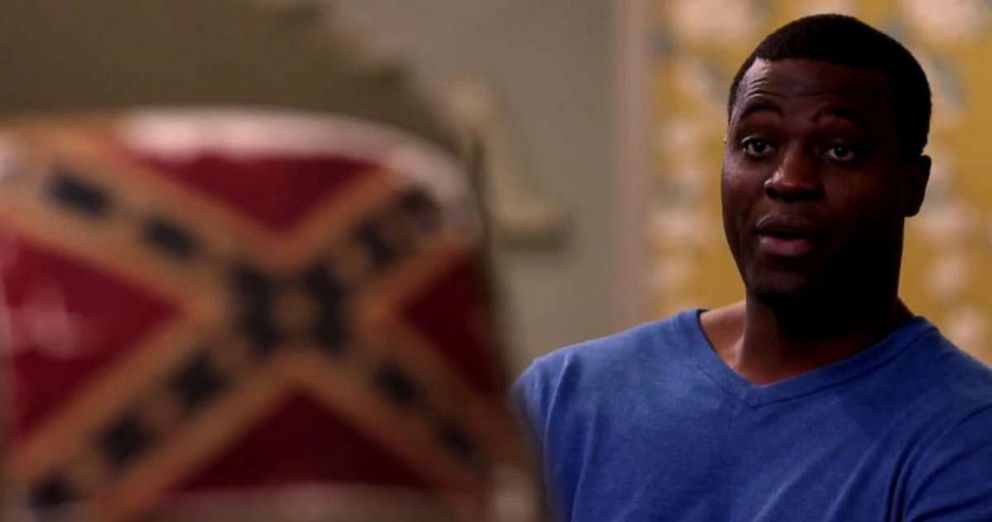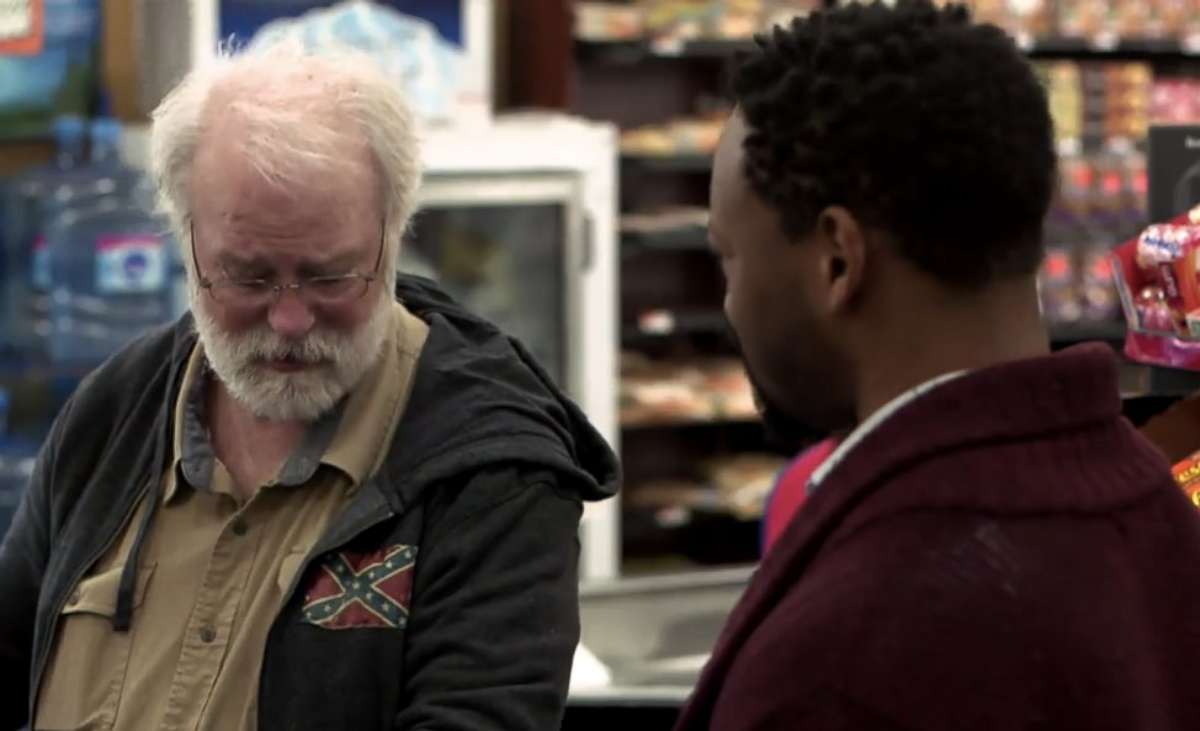Patron wears Confederate Flag in public: 'What Would You Do?'
With racial tensions rising in the United States, "What Would You Do?" continues to tackle topics at the forefront of social consciousness.
As protests against police brutality and racial injustice continue across the country, racial tensions are high. Protesters have denounced the Confederate Flag and Confederate monuments, even tearing some down. Schools and local governments have also removed these monuments and renamed schools and buildings. Institutions like the U.S. Marine Corps and NASCAR have taken a stand by banning the Confederate Flag from their events and properties. Last week, Mississippi passed a resolution to remove the Confederate emblem from its state flag -- it was the last remaining state flag to feature the symbol.
President Donald Trump has responded by signing an executive order to protect Confederate monuments. On Monday, he tweeted his disapproval of NASCAR’s decision to ban the Confederate Flag.
Tonight, ABC presents the premiere of a brand new season of “What Would You Do?” Tune in Tuesday, July 7th at 10/9c on ABC.
But how have individuals responded to the symbols still on display in places like a restaurant or a grocery store?
"What Would You Do?" shot this scenario more than a year ago -- before the coronavirus pandemic and recent protests against racial injustice -- in two different locations: Brooklyn, New York, and Hattiesburg, Mississippi. In the scenario, patrons react as a Black actor asks a white actor why he is wearing the Confederate Flag in public. The Black men in Brooklyn and Hattiesburg were played by Gabriel Lawrence and Philip Fornah, respectively. The white man wearing the Confederate Flag was played by Phil Baker.

In Brooklyn, "What Would You Do?" had Lawrence confront Baker while on the checkout line in a supermarket. In Hattiesburg, we had Fornah confront Baker while out for a bite to eat. Here is an excerpt of the actors' conversation in the restaurant Cotton Blues in Hattiesburg:
Fornah: Excuse me, is that a Confederate Flag, sir?
Baker: Yeah.
Fornah: You know, there’s a lot of Black folks that might find that symbol a little bit on that offensive side.
Baker: Well, I’m sorry about that. I mean no offense, yeah.
Fornah: Yeah.
Baker: It’s just part of my heritage. Very proud of being from Mississippi.
Fornah: You know, it’s a little jarring to see that in public so blatantly.
As the scenario plays out, nearby diners could hear the debate between the two actors. One couple sided with Baker's right to display the flag, saying, “He should just be able to wear his clothes. Just look the other way, sir. He’s explaining it means nothing.”
Fornah responded by saying that he sees the flag as an insult. The couple continued to defend Baker’s right to wear the Confederate Flag on his jacket, saying it’s related to “heritage” and encouraged Fornah to “let it go.”
Over 1,200 miles away, at a Brooklyn Key Food grocery store, cameras captured shoppers standing in line at the checkout while the scenario played out again.
Our Black actor Lawrence got our white actor Baker's attention by saying, “Excuse me, sir, why do you have that on your jacket?”
Baker smiled back proudly and said, “I’m from the South, born and raised.”
"It's a symbol of racism and hate," Lawrence responded, as shoppers began to pay attention. "You shouldn’t be wearing that in public.”
“I’m going to have to respectfully disagree with you," Baker responded. "I mean, I’m just honoring my ancestors.”

One shopper who overheard the exchange was then asked by Lawrence to engage in the debate.
"He knows what you're talking about. They don't care," the shopper told Lawrence.
When Lawrence asked the shopper what he thinks of when he sees the emblem, the shopper answered: "racism."
Tensions carried over into another iteration of the scenario later in the day, when another Black customer confronted Baker about the heritage he claimed to be honoring.
"It's part of our heritage, too," the shopper said. "But it's not a good heritage."
After overhearing the exchange and asking our actor, Baker, to remove the jacket, a customer in an adjacent line expressed concern for Baker’s safety. He later told “What Would You Do?” host John Quiñones that “they might want to hurt him. He’s in Brooklyn. He’s in New York. He’s not in Mississippi.”

Back at Cotton Blues in Mississippi, the reactions were mixed. One woman defended Baker's right to wear what he wants.
“I don’t totally agree with wearing something like that in public, but he’s got his right,” the woman said.
After Quiñones broke the scene for an interview, she explained her position, saying: “I’m from the South, I’m used to seeing it. It’s everywhere here, so it’s part of our heritage -- good or bad.”
However, not everyone at the restaurant shared that sentiment.
"What Would You Do?" rolled again on our scenario as two out-of-state patrons walked in; one from Michigan and the other from Oregon.
After hearing the exchange between our actors, the Michigan native offered Baker a quick history lesson on the Confederacy.
“I mean, facts are facts, and the Civil War was about defending slavery and the states that are part of the Civil War committed treason against the United States,” she said.
When Quiñones asked her later why she got involved, the diner replied, “I had to speak my mind.”
As we traveled between the North and South, patrons were steadfast in their positions regarding the Confederate Flag and its meaning. For some, it remains a tribute to their understanding of Southern history, but for so many others, the flag is a reminder of slavery, segregation, racism and hate.





